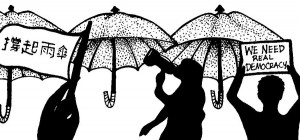Pro-democracy movement needs to first regroup, then fight on
For the past month, thousands of demonstrators have gathered in the streets of Hong Kong in protest of China’s decision to have an appointed committee screen candidates for the semiautonomous city’s elections in lieu of transparent universal suffrage. The leaders of the movement — dubbed the Umbrella Revolution by some — announced Sunday that they would cancel plans to conduct a poll surveying their supporters on the counterproposal to offers made by Hong Kong’s government in response to the protests, citing a lack of unity in the movement’s stance and actions.
The decision to call off the referendum was a responsible move on the part of the protests’ organizers as a means of regrouping and reaffirming the long-term goals and strategy of the diverse movement. The movement needs to rethink their strategy, but nevertheless, keep pressing on.
“We believe a mass movement should act according to the will of the people and we apologize to the public for the lack of discussion among the participants before making the previous decision,” the protest leaders said in a statement.
Though the movement’s call for open elections is still fundamentally important, the decision on the part of its leaders to regroup and reorganize their strategy is integral to its future success. That cannot be done, however, unless the protesters understand the diversity of opinions within their own ranks.
The two-day vote, which was to be issued via electronic ballot on Sunday and Monday, intended to ask participants to cast their votes on two motions regarding Hong Kong’s election procedures. The first question asked whether voters agreed that China’s central government should withdraw its Aug. 31 decision to limit Hong Kong’s 2017 chief executive election to a few pre-screened electoral candidates chosen by Beijing — the decision that ultimately sparked the Hong Kong protests in the first place. The second question asked whether the government should allow for the public nomination of candidates for the 2017 elections, instead of allowing the decision to be made by functional constituencies, or special interest groups in charge of electing 30 out of Hong Kong’s 70 legislators.
The decision to postpone the vote ultimately came as a result of the protest leaders’ realization that they did not have enough information to truly represent the views of all the protesters. This lack of unity is in large part due to the sheer diversity of the demonstrators within the Hong Kong protests. Many of the activists belong to one or more of the organized groups within the protests, and some don’t affiliate with any at all. Among the associations and groups represented in the movement are the Hong Kong Federation of Students, Scholarism and Occupy Central With Love and Peace.
A movement is nothing without direction and organization. But rather than retreat without a resolution, Hong Kong protesters should use this critical time in their movement’s history to reevaluate their goals and seek out meaningful ways of reaching them.
As the protests run into their second month of mobilizing, with no clear resolution in sight, it’s crucial that the movement’s leaders definitively define their collective goals and direction. Protesters cannot occupy the streets forever — at some point a decision must be made. But when that decision happens, it must be one that accurately represents the views and beliefs of those demonstrating, collectively.
Yasmeen Serhan is a junior majoring in international relations. She is also the special projects editor of the Daily Trojan. “Point/Counterpoint” runs Tuesdays.


